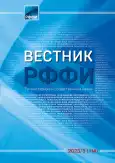Digital University Concept: Structure, Management, and Pedagogical Process Organization
- Authors: Neborsky E.V.1, Boguslavsky M.V.2, Naumova T.A.3
-
Affiliations:
- Institute of International Education at Moscow State Pedagogical University
- Institute of Educational Development Strategy
- Institute of Pedagogy, Psychology, and Social Technologies of the Udmurt State University
- Issue: No 3(114) (2023)
- Pages: 116-129
- Section: DIGITAL ENVIRONMENT AS A FACTOR, CONDITION, AND METHOD OF EDUCATION
- URL: https://bakhtiniada.ru/2587-6090/article/view/307083
- DOI: https://doi.org/10.22204/2587-8956-2023-114-03-116-129
- ID: 307083
Cite item
Full Text
Abstract
The research focuses on the concept of a digital university, its structure and management, as well as the arrangement of the educational process. According to an examination of academic papers, approaches to the establishment of a digital university may be classified into two broad categories: a digital university as a commercial model and a digital university as a public benefit. The authors propose a notion of a digital university using an integrative approach, merging four interdependent elements: digital format, digital environment, digital resources, and digital platform. A digital format is a type of combination of digital technology (a form of interaction) and content (an act of interaction). The digital environment is a space where interaction takes place. Digital resources are tools for activating the concept of a digital university (used by participants). A digital platform is an algorithm; a method of implementing the concept of a digital university (interaction implementation); and a platform for interaction (a structure where interaction occurs). The authors have created a digital university management structure by fusing the notion of a digital university with traditional management theory, which includes forecasting, planning, organization, incentive, coordination, and control for formulating and attaining the institution’s aim. As a fundamental strategy of managing the digital transformation of universities, the researchers propose an inclusion policy and an ecosystem approach. The authors have also developed a pedagogical activity model in the context of higher education digitalization, which encompasses educational process organization, teaching, value exchange, extracurricular activities, research activities, self-education, and advanced training. The study also examines future development potential, with the ultimate goal of realizing the university 4.0 concept.
About the authors
E. V. Neborsky
Institute of International Education at Moscow State Pedagogical University
Author for correspondence.
Email: ev.neborskii@mpgu.su
Doctor of Pedagogical Sciences, Associate Professor of the Department of Foreign Language Education
Russian Federation, MoscowM. V. Boguslavsky
Institute of Educational Development Strategy
Email: hist2001@mail.ru
Doctor of Pedagogical Sciences, Corresponding Member of the Russian Academy of Education, Chief Researcher at the Laboratory of Comparative Education and History of Pedagogy
Russian Federation, MoscowT. A. Naumova
Institute of Pedagogy, Psychology, and Social Technologies of the Udmurt State University
Email: nta64@yandex.ru
Candidate of Psychological Sciences, Associate Professor of the Department of Theory and Methods of Technological and Professional Education
Russian Federation, IzhevskReferences
- Gravett K. Different voices, different bodies: presence–absence in the digital universi-ty // Learning, Media and Technology. 2022. https://doi.org/10.1080/17439884.2022.2150637 (accessed 10.04.2023)
- Sheail P. The digital university and the shifting time–space of the campus // Learning, Media and Technology. 2018. Vol.43, Issue 1. P.56–69.
- Gourlay L. Posthuman texts: nonhuman actors, mediators and the digital university // Social Semiotics. 2015. Vol. 25. P. 484–500.
- Louw L., Deacon Q. Teaching Industrie 4.0 technologies in a learning factory through problem-based learning: case study of a semi-automated robotic cell design // Procedia Manu-facturing. 2020. Vol.45. P. 265–270.
- Johnston B., Macneill Sh., Smyth K. Conceptualizing the Digital University: The In-tersection of Policy, Pedagogy and Practice. New York: Palgrave, MacMillan, 2018. 265 p.
- Peters M., Jandric P. The Digital University: A Dialogue and Manifesto. NY., 2017.
- Peters M., Jandrić P. Peer production and collective intelligence as the basis for the public digital university // Educational Philosophy and Theory. 2018. Vol.50, Issue 13. P. 1271–1284.
- Kumar M. Digital University — Indian Education Reaching out to Everyone // IETE Technical Review. 2022. Vol. 39, Issue 1. P. 1–2.
- Min-Allah N., Alrashed S. Smart campus — A sketch // Sustainable Cities and Society. 2020. Vol.59. 102231.
- Wu F., Zheng Q., Tian F., Suo Z., Zhou Y., Chao K.-M., Xu M., Shah N., Liu J., Li F. Supporting poverty-stricken college students in smart campus // Future Generation Computer Systems. 2020. Vol.111. P. 599–616.
- Gourlay L. Posthumanism and the Digital University: Texts, Bodies and Materialities. New York: Bloomsbury Academic, 2020. 200 p.
- Critical Digital Pedagogy: a Collection / ed. J. Stommel. Madison, 2020. 334 p.
- Hassan R. The worldly space: the digital university in network time // British Journal of Sociology of Education. 2017. Vol.38, Issue 1. P. 72–82.
- Zuev S.E. Universitet. Hranitel' ideal'nogo. Nechayannye esse, napisannye v uedinenii. M.: Novoe literaturnoe obozrenie, 2022. 264 s. (in Russian)
- Bouen U. Vysshee obrazovanie v cifrovuyu epohu. M.: VSHE, 2018. 224 s. (in Rus-sian)
- Neborskii E.V. Cifrovoj universitet kak integrativnyj metodologicheskij konstrukt // Mir nauki. Pedagogika i psihologiya. 2021. №3. https://mir-nauki.com/PDF/41PDMN321.pdf https://doi.org/10.15862/41PDMN321 (accessed 10.04.2023) (in Russian)
- Brøuža V., Byška J., Mičan J., Kozlíková B. VRdeo: Creating Engaging Educational Material for Asynchronous Student-Teacher Exchange Using Virtual Reality // Computers & Graphics. 2021. Vol. 98. P. 280–292. https://doi.org/10.1016/j.cag.2021.06.009 (accessed 10.04.2023)
- Meskon M., Al'bert M., Hedouri F. Osnovy Menedzhmenta. M.: Delo, 1997. 704 s. (in Russian)
- Neborskii E.V. Cifrovaya ekosistema kak sredstvo cifrovoj transformacii universiteta // Mir nauki. Pedagogika i psihologiya. 2021. №4. https://mir-nauki.com/PDF/02PDMN421.pdf https://doi.org/10.15862/02PDMN421 (accessed 10.04.2023) (in Russian)
- Neborskii E.V. Rekonstruirovanie modeli universiteta: perekhod k formatu 4.0 // Inter-net-zhurnal «Mir nauki». 2017. T.5, №4. - Rezhim dostupa: http://mir-nauki.com/PDF/26PDMN417.pdf https://dx.doi.org/10.15862/26PDMN417 (accessed 10.04.2023) (in Russian)
Supplementary files









